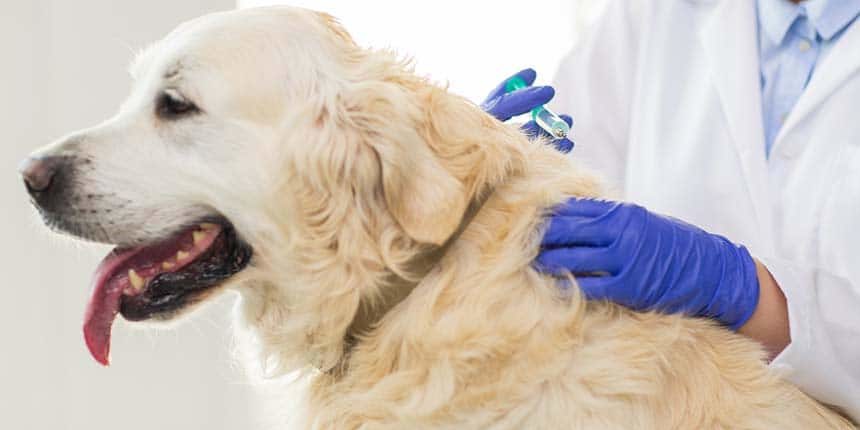Your dog depends on you to keep it happy and healthy. Whether you have a puppy or an adult dog, one of the best ways to keep them healthy, is to keep up with the recommended vaccine schedule with dhpp vaccinations because recommended vaccinations protect your dog from the Following:
- The Distemper/Parvovirus combination vaccine
- Rabies vaccine
- Bordetella
- Lyme Disease
- Leptospira
- Canine Influenza.

Illnesses can be life threatening to your Dog. The outdoors and other dogs can give your dog these illnesses. These illnesses include lyme disease, viral diseases, canine influenza, and canine parvovirus.
The information is only a guide. Always consult with your veterinarian for correct vaccine guidelines. Below are recommendations on the best vaccinations for your dog!
Vaccine Requirements
Dogs are required to be vaccinated for these kinds of diseases for a license in most cities. Most doggy daycares, kennels, and groomers will only care for dogs that have been fully vaccinated. It’s a big deal!
Vaccination Schedule
When you take your dog in to your veterinarian for check-ups and vaccines, they may mention a vaccination schedule. This schedule tells the vet and pet owner what vaccinations to give, and when to give them. Depending on where you live, your dog may be on a slightly different vaccination schedule. Vaccines can be required or elective. There are core required vaccines and there are elective vaccines.
Core Required Vaccinations
The core required vaccinations are:
- distemper/parvovirus combination vaccine
- rabies vaccine.
Elective Vaccinations
The elective vaccinations are:
- Bordetella
- Leptospira
- Lyme
- Canine Influenza.
Vaccination Schedule
The vaccination schedule is different for puppies and adult dogs.
Puppy Vaccination Schedule
- Distemper – Starting at 6 weeks of age, puppies will get a distemper vaccine every 2-4 weeks for a total of 3 distemper vaccines.
- Rabies – puppies older than 12 weeks of age get vaccinated. 1 year later dogs get a Booster
- Bordetella – Dogs older than 8 weeks get the Bordetella vaccine intranasally.
- Leptospira, Lyme, and Canine Influenza – The leptospira, lyme, and canine influenza vaccines are given to dogs older than 8 weeks and are boostered 2-4 weeks after the initial vaccine.
Mature Dog Vaccination Schedule (Dogs Older Than 1 Year)
- Distemper – Boostered every 1-3 years.
- Rabies – Every 1-3 years.
- Bordetella – Boostered annually.
- Leptospira, Lyme, and Canine Influenza – Boostered annually.
There are several different varieties of the distemper/parvo combination vaccine for dogs which will be discussed.
What is the DHPP Vaccine for Dogs?
The DHPP vaccine for dogs is a combination vaccine that prevents four different viruses: canine distemper, infectious hepatitis, parainfluenza, and parvovirus. After the initial puppy series, this vaccine is given every 1-3 years.
What Does the DHPP Vaccine for Dogs Prevent?
There are four serious viruses that the DHPP vaccine for dogs protects against.
vaccinating against canine distemper is so important because it has no cure and is highly contagious virus. Dogs come in contact with Distemper through the air and contact with other dogs.
The virus starts in the tonsils and lymph nodes. From there, it attacks the respiratory, renal, gastrointestinal, and nervous systems.
Distemper Symptoms
Early symptoms include a high fever, red eyes, and discharge from both the nose and eyes. A dog infected with this virus will soon become lethargic and lose their appetite and may also suffer from prolonged and persistent coughing, vomiting, and diarrhea. When the virus moves to the nervous system, it attacks the brain and spinal cord which leads to seizures or paralysis. Dogs with weak immune systems like puppies and older dogs could die within two to five weeks after becoming sick.
Can Distemper be Cured?

There is no cure for distemper. Treatment focuses on managing the symptoms, like IV fluids to prevent dehydration or medication to control any seizure activity. A healthy dog with a weak strain of the virus can recover, though some of the nervous system effects will take months to go away.
The canine adenovirus starts as an upper respiratory infection that targets the functional parts of various organs. Once it moves from the tonsils to the bloodstream, it settles in the liver. It uses the body’s own cells to replicate and quickly spreads through the liver. It can also spread to other organs such as the kidneys.
Symptoms of Hepatitis in Dogs
Symptoms range from lethargy, loss of appetite, fever, and abdominal pain in mild infections to bleeding and coagulation disorders, bruising, swelling, and swollen lymph nodes. Treatment is usually done on an inpatient basis to replace fluid and electrolytes, treat any blood clotting problems, and monitor progress.
Can Hepatitis be Cured in Dogs?
A healthy dog will be able to get rid of the virus in about two weeks, but it will remain in the kidneys and continue to shed through urine for up to 9 months. Un-vaccinated dogs can come in close contact with the disease.
If a dog is unable to clear the virus on his own, he’ll develop chronic hepatitis as the virus remains in the liver. The front of the eye gets inflamed and causes the telltale “hepatitis blue eye.” leading to eye injuries.

The Parainfluenza virus spreads easily, especially in places with high dog populations like kennels or doggy daycares. All dogs are susceptible, but puppies and older dogs typically have a more difficult time recovering.
Parainfluenza Symptoms in Dogs
While parainfluenza virus is often mistaken for kennel cough but there are actually some significant differences. Kennel cough does not have any other symptoms while the parainfluenza virus can also present with signs other than respiratory symptoms, including fever, runny eyes, loss of appetite, and lethargy. There’s also a risk for pneumonia.
Can Parainfluenza in Dogs be Cured?
Treatment consists of isolating the dog so the virus doesn’t spread. Antibiotics and antivirals are often given for the illness to reduce the risk of exposing other dogs.
Parvovirus can affect your dog in two different ways. The most common way is to attack the gastrointestinal system. These symptoms include vomiting, diarrhea, poor appetite, dehydration, and weight loss.
The other rare, more serious form is when the virus attacks the cardiac muscles of neonatal puppies which often can lead to death.
Parvovirus affects most dogs and puppies between the ages of six weeks and six months. This is the same time period when the vaccination is given which is why it has significantly reduced the incidence of parvovirus in young puppies.
Parvovirus Symptoms in Dogs
Signs of a gastrointestinal infection include severe bloody diarrhea, lethargy, a loss of appetite, vomiting, and weight loss. Dogs can quickly become dehydrated. There’s no cure and treatment focused on managing symptoms.
Can Parvovirus in Dogs be Cured?
Unfortunately, this virus can be pretty severe and only has a 10% survival rate without treatment, but this can improve to 70% with treatment and can be 100% prevented with vaccines. So it’s best to vaccinate against this deadly virus!
Why is the DHPP Vaccine For Dogs Important?
As you can see, the viruses that the DHPP vaccine for dogs protects against are pretty serious. At the very least, your dog will have months of a long and difficult recovery. These illnesses are all serious enough that they can lead to death in some circumstances.

Getting the DHPP vaccine can spare your dog a lot of pain and protect them from the long-term effects of these viruses. It could even save their life and the lives of any dog that they come in contact with. While a lot of the symptoms are treatable, the risks are just too high.
The only way to keep your dog safe from these terrible illnesses is to make sure your dog is vaccinated. If you are unsure of this vaccine or any other important vaccines like the rabies vaccination, or you just general pet health, talk to your local veterinarian today.
What Does the DAPP Vaccine Prevent?
The DAPP is essentially just another name for DHPP. The A in DAPP stands for “adenovirus”, while the H in DHPP stands for “hepatitis”. Adenovirus is an infection that causes canine hepatitis. So, if your dog receives the DAPP vaccine, they will be protected from the virus that causes hepatitis. The DAPP vaccine, like the DHPP vaccine for dogs, is part of the DHLPPC vaccine, which we will discuss below.
What Does the DHLPPC Vaccine Prevent?
The DHLPPC vaccine is similar to DHPP and DAPP, in that it protects against distemper, hepatitis, parvovirus, and parainfluenza virus, but it also prevents additional diseases: leptospirosis and coronavirus. Your vet may recommend this combination vaccine if you live in an area with a higher risk of leptospirosis or coronavirus. In some regions, the risk is so low that there is no reason to use the DHLPPC vaccine.
- Leptospirosis
Leptospirosis is a bacterial infection that gets into the dog’s bloodstream through the skin. It’s more common in warm, wet climates like the tropics or in marshy, muddy areas with stagnant water. As it enters the bloodstream, it can get anywhere in a dog’s body. It commonly affects the liver and kidneys, but can also affect the central nervous system, eyes, and the reproductive system. It stays in the kidneys for an extended period of time and can be fatal, in some cases.
Leptospirosis Symptoms in Dogs

Symptoms include sudden onset of fever, sore muscles, a decline in activity, shivering, a depressed mood, a lack of appetite, excessive thirst and urination, vomiting and diarrhea that may contain blood, jaundice, difficulty in breathing, a runny nose, and swelling of the gums and lymph nodes.
Can Leptospirosis be Cured?
There is no cure for Leptospirosis, but thankfully, early treatment can be effective.
In the early stages, treatment involves hospitalization for hydration, a urinary catheter to monitor urine output, an antiemetic to stop vomiting, and a feeding tube if the dog refuses to eat. If there has been a lot of blood loss, a transfusion may be necessary.
Antibiotics are prescribed for the illness. The prescription varies depending on the stage of the illness. As long as treatment is initiated and none of the dog’s organs are damaged, it’s likely the dog will survive.
Leptospirosis Vaccine Side Effects
The Leptospirosis vaccine is not usually part of the vaccination program for dogs. Some of the lepto vaccine side effects in dogs include lethargy for a few days and a decrease in appetite. For some breeds, such as the West Highland White Terrier and Miniature Dachshunds, can have an anaphylactic shock-like reaction after receiving the vaccine. Other dogs may show reactions through a skin rash. Reach out to your veterinarian if you want to know more information about the lepto vaccine side effects in dogs.
The coronavirus is a virus that affects the intestines in dogs. The coronavirus causes inflammation of the intestines and weakening of the immune system. It’s a relatively new disease discovered in dogs in the 1970s and is thought to have been transmitted to dogs originally from cattle.
Coronavirus Symptoms in Dogs
- Watery diarrhea
- Nausea
- Lack of appetite
- Vomiting
- Hard or bloated belly
- Fever
- Cough, sneezing and other respiratory symptoms
Can Coronavirus be cured?
This can be cured but it will take treatments of antibiotics to keep the dog from developing other illnesses related to a week immune system like pneumonia. It’s also good to quarantine your dog from other just because this virus is highly contagious. Your dog will also need to keep hydrated due to the loss of fluids through diarrhea and vomiting.
What is the Rabies Vaccine?

The rabies vaccine for dogs prevents them from developing rabies. Rabies can develop after a bite from a wild animal (including raccoons, skunks, bats, and foxes). A dog’s first rabies vaccine should be administered when they’re 3 or 4 months old. An annual booster is recommended. After that, the vaccine will need a booster every 1-3 years, depending on where you live. This is one of the most important vaccines apart from the DHPP vaccine and is typically required by law.
Rabies Symptoms in Dogs
Although it can take a few weeks after a bite for symptoms to first appear, the symptoms will worsen quickly once the virus takes hold. Common symptoms include fever, seizures, paralysis, pica (eating a non-food item), aggression, and an inability to swallow. Rabies can sometimes be identified by excessive, frothy salivation, which is sometimes referred to as “foaming at the mouth.”
Can we cure Rabies?
There is no cure for rabies. If an unvaccinated dog contracts rabies, the virus will be fatal. If you believe your dog may have come into contact with a rabid animal, it is very important that you take it to your veterinarian for an exam as soon as possible. Rabies is an especially threatening disease because it can be transmitted to humans.
What is the Canine Influenza Vaccine?

The canine influenza vaccine is very similar to the flu shots that we get. It protects dogs from canine flu H3N8 and/or H3N2, which are the two strains of canine flu virus that have been found in the United States. The canine flu is a year-round problem for dogs (unlike the seasonal flu virus that affects humans). This vaccine is still relatively new, and not all vets recommend it because it isn’t necessary for all dogs. Canine influenza is highly contagious, so dogs who spend a lot of time around other dogs are more likely to benefit from this vaccine. Your vet may also be more likely to recommend it if you live in an area where the rate of canine influenza is high.
boosters are given 2-4 weeks after the initial vaccine is given.
Canine Influenza Symptoms
Symptoms of the canine flu are quite similar to the symptoms we experience when we get the flu. This includes coughing, sneezing, fever, runny nose, lethargy, and a loss of appetite. Some dogs may only experience mild symptoms, while others experience more severe symptoms. Canine influenza can affect a dog anywhere from a week to a month.
Can We Cure Influenza?
Although there isn’t a cure for canine influenza, the vast majority of dogs will get better on their own. The virus is only fatal in less than 10% of cases. However, some dogs may need help to facilitate recovery. They may need IV fluids if they go too long without drinking, or antibiotics if they develop a respiratory infection.
What is the Bordetella Vaccine?
The tracheobronchitis vaccine prevents bordetella. “Kennel Cough” is a reference for Bordetella. It’s a very important vaccine, especially if your dog spends a lot of time around other dogs. In fact, many doggy daycares and groomers will not allow dogs who have not been vaccinated against kennel cough. Recommendations are given for boosters annually after the initial vaccine is given. These boosters are especially important for dogs who spend a lot of time at dog parks, doggy daycares, groomers, agility trials, and other high-risk places.
Bordetella Symptoms

Kennel cough is a highly contagious disease that primarily affects a dog’s respiratory symptom. They may experience a runny nose, fever, sneezing, and a bad cough. The cough may be a harsh dry cough or could be a cough that produces phlegm. It may sound similar to the honking sound that geese make. Symptoms will normally fade in a week or two. Since Bordetella symptoms are similar to the symptoms of other diseases, it’s important to take your dog to your veterinarian and find out exactly what is causing your dog to feel sick.
Can we cure Bordetella?
There is no cure for Bordetella, but most dogs recover on their own. Dogs that are older or already have weakened immune systems may have a tougher time recovering. However, most dogs will start to feel completely better within a few weeks. For dogs that don’t, treatment may be necessary. In most cases, treatment will be cough medication and antibiotics that can help fight off the bacteria that causes Bordetella.
Conclusion
Now that you know all about the DHPP vaccine for dogs and all the other vaccines, it’s time to schedule a trip to see your veterinarian! Vaccinating your dog is one of the most important steps in ownership.






